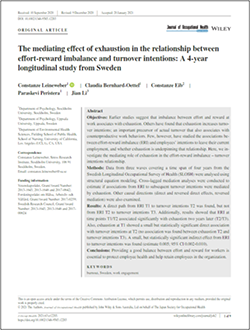#0117 The mediating effect of exhaustion in the relationship between effort-reward imbalance and turnover intentions: A 4year longitudinal study from Sweden

Tired and True: Is Exhaustion the Middleman Between Effort–Reward Imbalance and Employee’s Intention to Quit?
Studies have shown that, when an employee feels like their efforts are not adequately rewarded, they are more likely to consider resigning (turnover) or even engage in counterproductive behaviors. This perceived effort–reward imbalance (ERI) can also have a bad impact on employee health, and it is therefore considered a very serious problem in the workplace both for the employer and the employee.
But are there other mechanisms that mediate the relationship between ERI and turnover intentions? Some researchers have tried to determine if a high ERI is related—or even precludes—other negative factors in the workplace, such as low job satisfaction or exhaustion. However, the results of their studies have been either inconclusive or only limited to specific types of jobs or professions.
In our study, we aimed to fill this knowledge gap by exploring the possible relationships between ERI, turnover intentions, and exhaustion. We hypothesized that ERI could be used to predict exhaustion and subsequent turnover intentions, and we sought to determine if exhaustion has a mediating effect in the proven relationship between ERI and turnover intentions.
We used data from a large dataset called the Swedish Longitudinal Occupational Survey of Health (SLOSH), which accurately represents the general Swedish working population. SLOSH data is collected via comprehensive questionnaires every two years, and we used the data from the latest three waves (2014, 2016, and 2018) in our longitudinal study. After filtering, a total of 7375 working respondents were included in the analyses.
Not only did we check for the mediating effect of exhaustion on ERI and subsequent turnover intentions, but also explored other possible cause-and-effect relationships between these factors. After analyzing the results of various statistical models, we indeed found evidence that suggests ERI precedes exhaustion. The evidence was inconclusive for ERI being a precursor of later turnover intentions, even though the two were associated strongly. We did, however, find that exhaustion acts as a mediator between ERI and turnover intentions.
Turnover intentions and the negative behaviors associated with it represent great monetary and knowledge costs for organizations. Thus, our study points toward ways to mitigate employee turnover by addressing the balance between effort and rewards. This should also contribute to reducing exhaustion and have a positive effect on employee health. Some possible ways to reduce ERI is ensuring good communication between managers and personnel, providing appropriate incentives, and organizing stress management interventions when necessary.

Link to the original journal article:
https://onlinelibrary.wiley.com/doi/full/10.1002/1348-9585.12203
Title of the paper:
The mediating effect of exhaustion in the relationship between effort-reward imbalance and turnover intentions: A 4year longitudinal study from Sweden
Authors:
Constanze Leineweber, Claudia Bernhard-Oettel, Constanze Eib, Paraskevi Peristera, Jian Li




